Key takeaways:
- A digital footprint represents the data trail left by users online, necessitating awareness and management to protect privacy and opportunities.
- Consumer protection is crucial in safeguarding personal information and fostering trust in online transactions and interactions.
- Managing a digital footprint includes monitoring online presence, using privacy tools, and being cautious about the personal information shared.
- Developing healthy online habits, such as setting boundaries and mindful engagement, is essential for a balanced digital life.
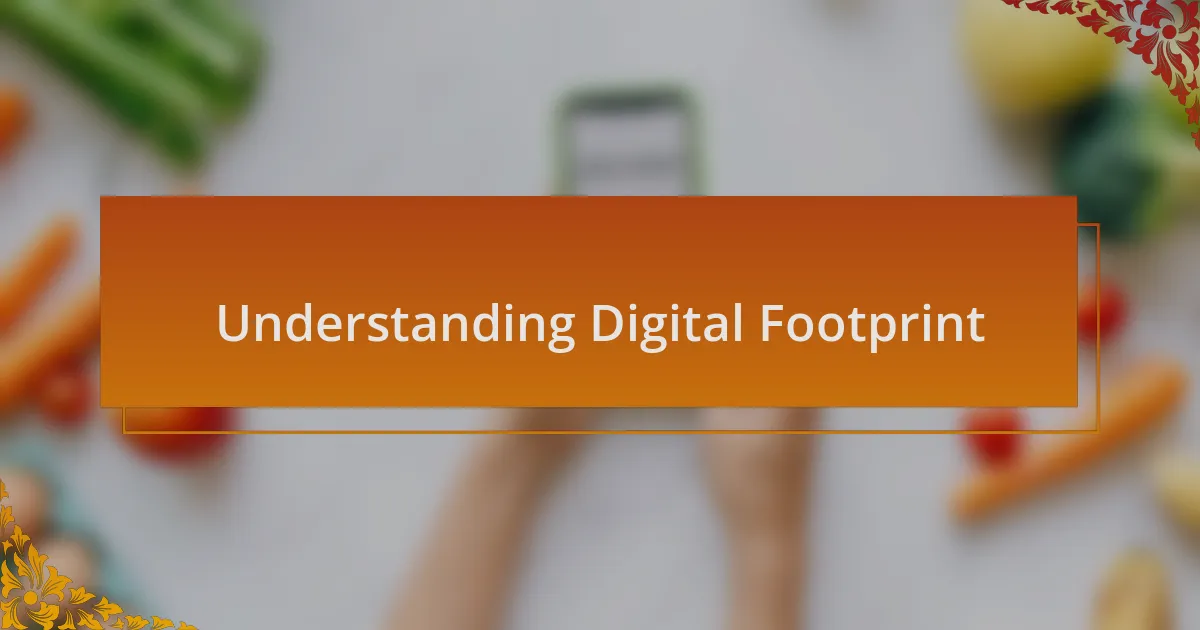
Understanding Digital Footprint
A digital footprint refers to the trail of data we leave behind while using the internet. It’s like a modern-day breadcrumb path, showing where we’ve been and what we’ve done online. I remember the first time I realized how extensive my footprint was—browsing through my social media settings and seeing a list of all the apps that had access to my account made me feel a bit exposed.
Most of us often don’t think about the implications of our digital activities. For instance, when I share a photo or post a comment, do I consider how it might be perceived years down the line? It’s a bit unsettling. This makes me more mindful of what I share, knowing that my digital actions could resurface unexpectedly.
Understanding your digital footprint isn’t just about knowing it exists—it’s about knowing how to manage it effectively. I find myself regularly reviewing my privacy settings and deleting old accounts. Have you ever wondered what lingering information about you might be floating around online? Taking charge of my digital presence has turned from a chore into a proactive choice for my security and peace of mind.

Importance of Consumer Protection
Consumer protection plays a crucial role in today’s digital landscape, especially as we become increasingly reliant on online platforms. I often think about how vulnerable I am when entering my personal information on sites that may not have my best interests at heart. Each time I hear about a data breach in the news, it heightens my awareness of how essential it is to safeguard consumer rights and ensure our digital identities are protected.
When I browse the internet, the importance of consumer protection resonates deeply with me. It’s not just about financial transactions; it’s about having a say in how my data is used. For example, after learning about misleading advertisements that prey on unsuspecting consumers, I felt empowered to report such practices, reinforcing how vital consumer protection is in promoting fairness and transparency online.
Moreover, consumer protection fosters trust in the marketplace. I recall a time when I hesitated to make an online purchase because of concerns over privacy and security. By ensuring that companies adhere to strict consumer protection laws, I can shop with confidence, knowing that there are measures in place to address unethical practices. It’s this sense of security that not only encourages me to engage with brands but also empowers me to demand better standards for everyone.
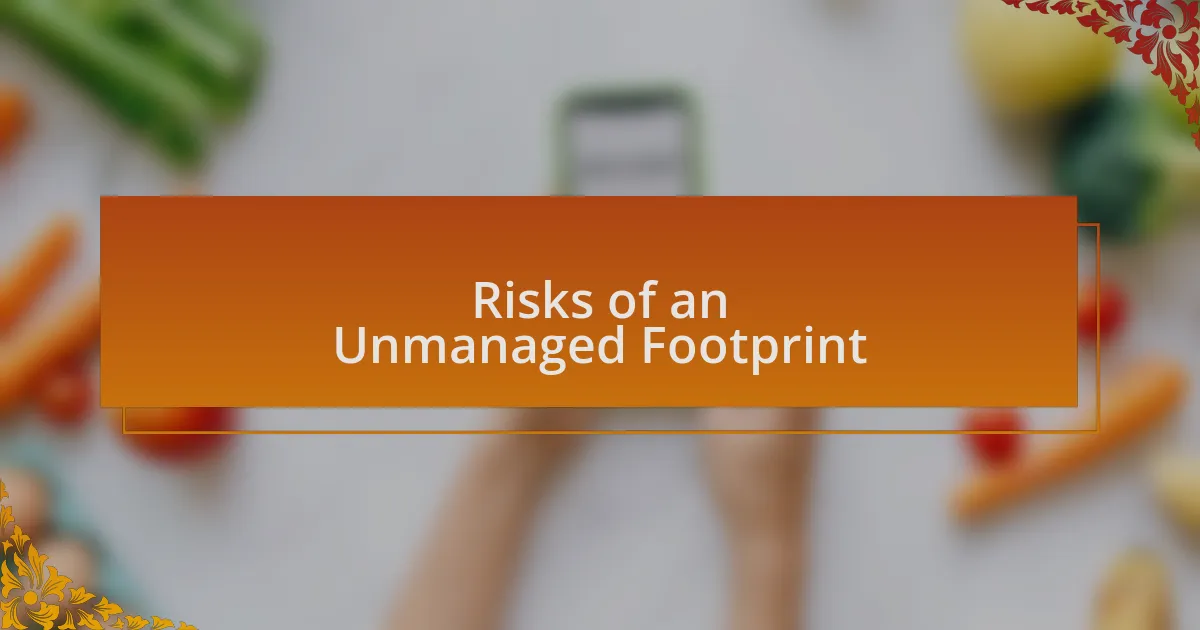
Risks of an Unmanaged Footprint
When I think about the risks of an unmanaged digital footprint, I often recall an incident where my own data was splattered across various sites after signing up for what I thought was a harmless newsletter. It felt like an invasion of privacy to discover my email address had been sold to third-party marketers without my consent. That experience reminded me just how quickly personal information can slip right out of our control.
Another danger looms when it comes to identity theft. I’ve seen firsthand how easily someone can impersonate another person online. A friend of mine lost thousands of dollars because her personal information was compromised. Such stories serve as stark reminders that an unmanaged digital footprint isn’t just an annoyance; it can lead to severe financial and emotional distress.
It’s also troubling to consider that employers often research potential hires through their online presence. I’ve found myself tweaking my social media profiles after hearing about someone who lost a job opportunity due to an inappropriate post from years ago. Isn’t it unsettling that a momentary lapse can haunt us indefinitely? Taking charge of my digital footprint is essential, not just for my peace of mind, but to preserve my future opportunities.
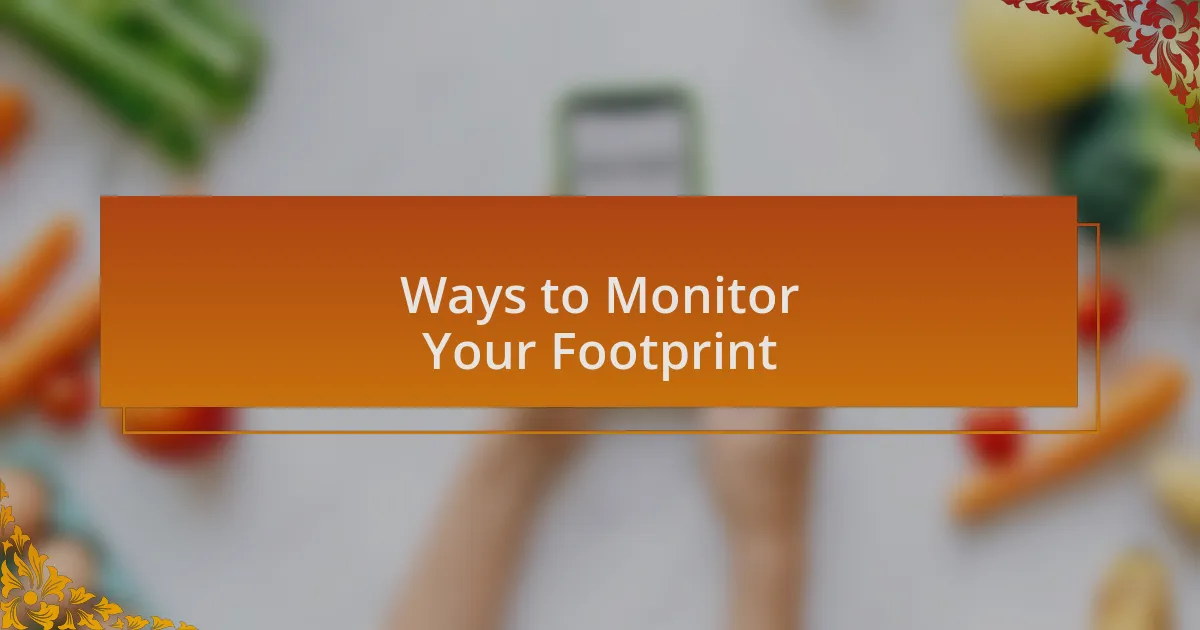
Ways to Monitor Your Footprint
Monitoring my digital footprint is an ongoing process that I’ve come to prioritize. One effective method I’ve used is regularly searching my name online. The first time I did this, I was surprised to find old forum posts from a decade ago that I had forgotten about. It’s a powerful exercise to see what others might find and use this knowledge to curate a more positive online presence.
Another strategy I’ve found useful is using privacy tools and browser extensions that keep track of my data. There was a time when I felt utterly overwhelmed by the number of sites tracking my activities. Implementing these tools not only provided me with an overview of where my information is going, but also a sense of control that eased my anxiety. Have you ever wondered how many companies are quietly compiling your data? With the right tools, you can stay informed and take action.
I also rely on regularly reviewing my privacy settings on social media platforms. For a while, I didn’t think twice about accepting friend requests or allowing apps to access my information. After realizing that a simple oversight could lead to unwanted exposure, I began to actively assess and tighten my settings. This practice has given me greater peace of mind, knowing that I’m more aware of who sees my posts and how my information is being used. Have you considered what might slip through the cracks if you don’t take a closer look?
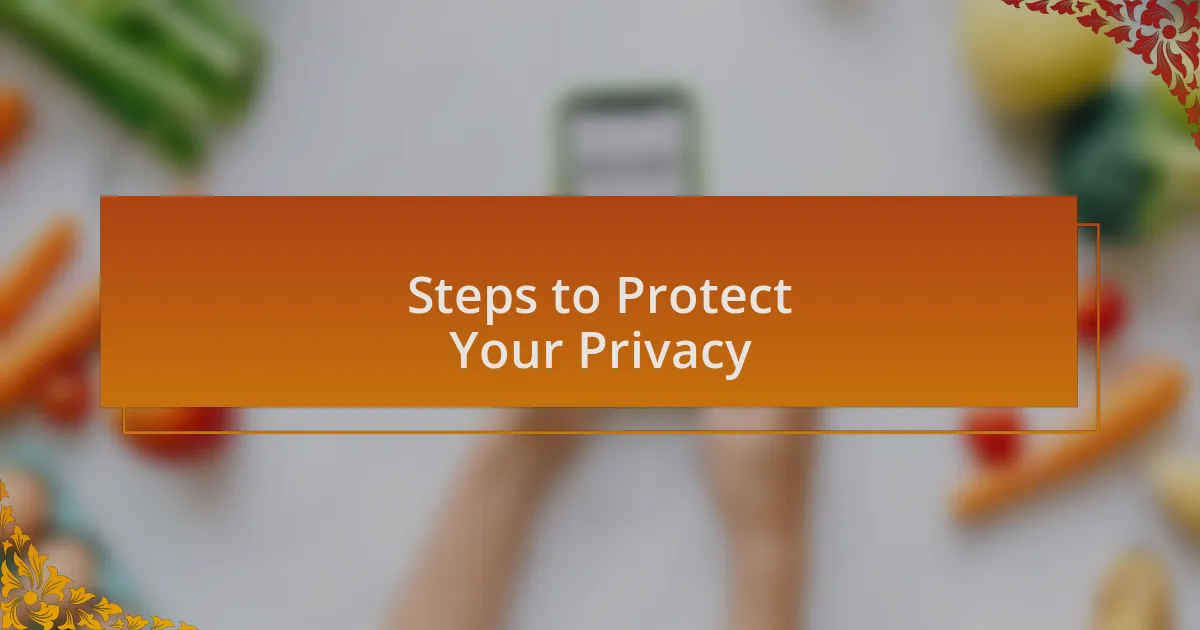
Steps to Protect Your Privacy
One of the first steps I take to protect my privacy online is regularly updating my passwords. I remember one occasion when I used the same password across multiple sites, thinking it was convenient. After a friend had his account hacked, I realized the risks of this approach. Now, I use a password manager to create unique, complex passwords, which not only shields my accounts but also grants me peace of mind.
Another method I’ve found crucial is being discerning about the personal information I share. I once shared a lot of personal details on a forum, thinking it would help me connect with others, but later regretted it as those details resurfaced in unexpected ways. Now, I think twice before posting anything that could be sensitive. It’s essential to ask yourself: would I be comfortable if this information were public? If the answer is no, it’s best to keep it to yourself.
I also make a habit of evaluating app permissions on my devices. There was a time when I carelessly allowed apps to access my contacts and location, unaware of the implications. After learning about data privacy, I started to revisit those permissions regularly. This little practice has been an eye-opener for me, highlighting just how much control I truly have in managing my personal information. Have you taken the time to check what your apps have access to? It could change how you share your digital life.
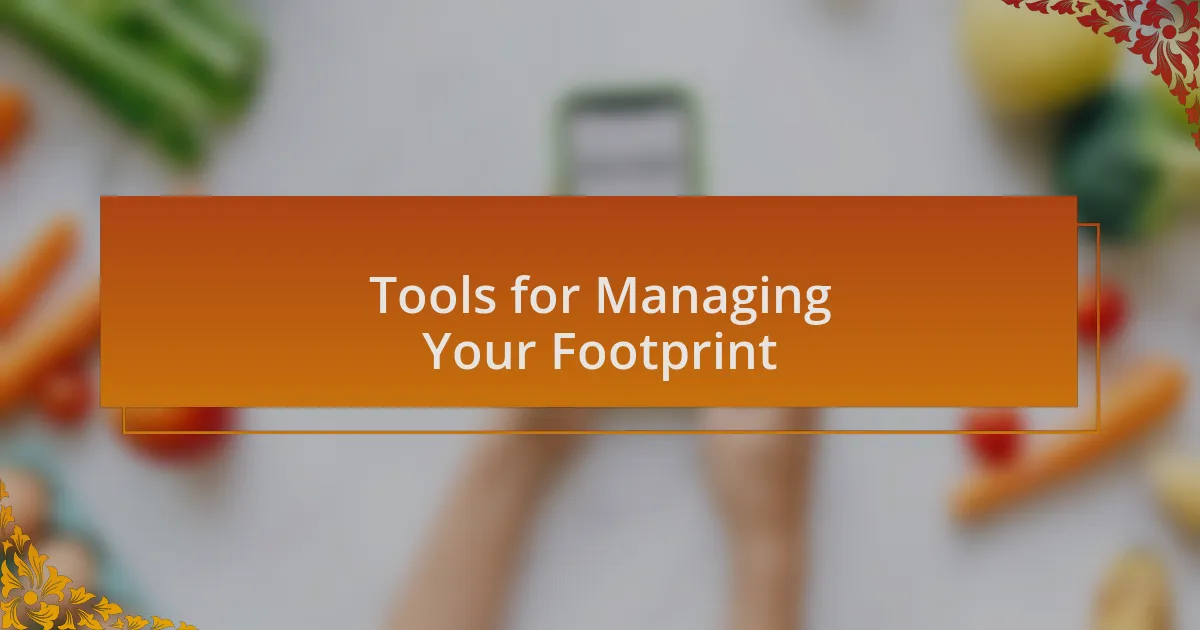
Tools for Managing Your Footprint
When it comes to tools for managing my digital footprint, I have found browser extensions to be incredibly useful. For instance, I use ad blockers and tracking protection features that significantly reduce the amount of data collected by websites. It’s eye-opening to see how many ads and trackers are blocked in a single session; it makes me feel more in control of my online experience. Have you tried using these tools? They might just change your browsing habits for the better.
I also take advantage of data management tools offered by platforms like Google and Facebook. They allow me to review and delete my activity history, which can feel like a refreshing cleanse. Recently, I was shocked to discover old interactions I had completely forgotten about. This process reminded me that my digital past doesn’t have to haunt my present. Are you aware of what your online profiles reveal about you?
Moreover, I’ve started using privacy-focused search engines like DuckDuckGo. This choice has been liberating because it doesn’t track my search queries or tailor results based on my previous behavior. It’s a small shift, but it feels reassuring to search without the nagging worry of being constantly monitored. What if you could explore the internet without being followed? It’s worth considering, as it can significantly reduce the sense of being overwhelmed by constant surveillance.
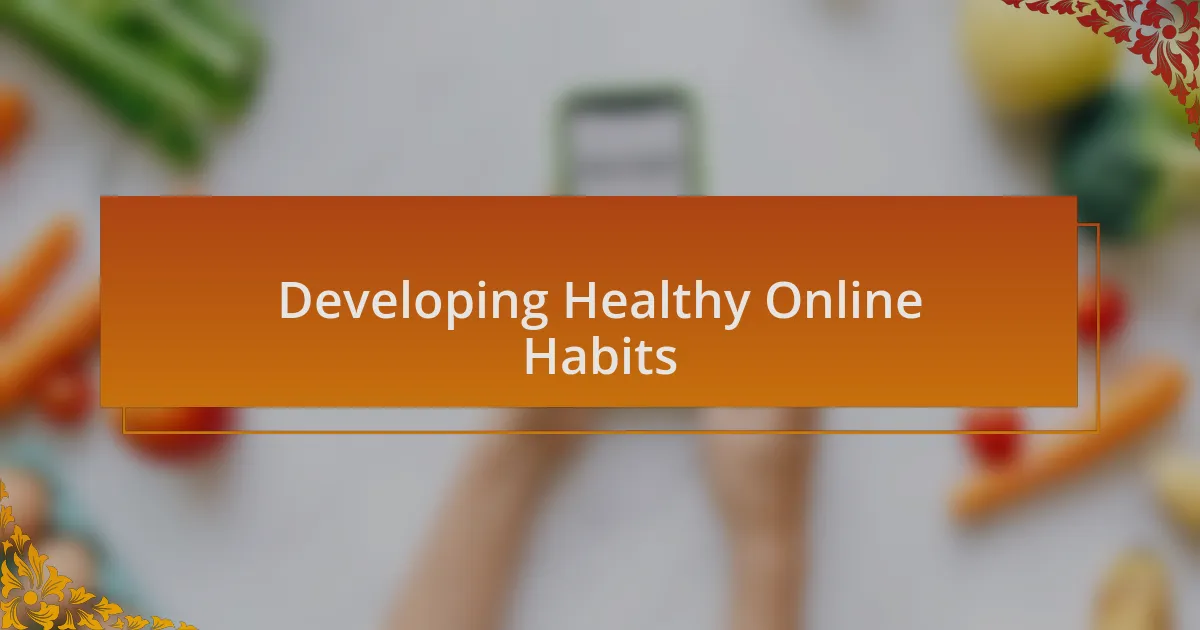
Developing Healthy Online Habits
Developing healthy online habits has become essential in our digital world. For me, setting boundaries around screen time has been transformative. I’ve learned to designate specific hours for work and downtime—this not only helps me recharge but also prevents digital fatigue. Have you ever noticed how refreshing it feels to take a break from screens?
Additionally, I’ve made a habit of regularly evaluating the apps and platforms I use. If an app feels invasive or doesn’t serve a clear purpose in my life, I’m quick to uninstall it. Recently, I removed a social media app that was draining my energy rather than enriching my connections. Have you stopped to think about the impact of your digital tools on your daily life?
Another key practice I’ve adopted is mindfulness while browsing. I consciously avoid mindless scrolling, opting instead for purposeful engagement. When I’m active online, I ask myself if I’m consuming content that adds value to my life or if I’m just filling time. This simple shift has helped me curate a more positive digital environment. How intentional are you with the content you engage with?